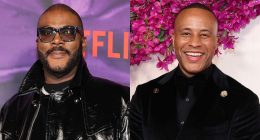
The Berlinale’s pick of M. Night Shyamalan for its 2022 jury president surprised many. At first glance, the blockbuster director of The Sixth Sense, Unbreakable and Split seems an incongruent choice to judge the competition lineup of one of the world’s premier art house festivals. But it suits the self-image of the Indian-born, Philly-raised helmer.
“On a practical level, I live 3,000 miles away from Hollywood [in Philadelphia] and I’ve always perceived myself as an independent filmmaker,” Shyamalan notes. “Internationally, I’m received much more that way.”
Shyamalan, together with fellow Berlinale jury members, including Danish actress Connie Nielsen (Wonder Woman), Elle producer Saïd Ben Saïd, directors Ryusuke Hamaguchi (Drive My Car), Anne Zohra Berrached (24 Weeks) and Karim Ainouz (Love for Sale), as well as Booker Prize-nominated Zimbabwean novelist Tsitsi Dangarembga, will unveil the Gold and Silver Bear winners of the 72nd Berlinale on Feb. 16.
Shyamalan spoke to The Hollywood Reporter‘s European Bureau Chief Scott Roxborough ahead of the festival about the need for more original stories on screen, why genre movies are still treated as second-class cinema and why he the prospect of spending a week watching festival films makes him feel “like a kid in a candy shop.”
What was your first reaction when Berlin asked you to be this year’s jury president?
I was thrilled, really thrilled. Doing this is so much in alignment with how I think about cinema and life. It’s such an honor and so exciting because I think film festivals are how most of us began. I did.
For me, film festivals have always been this rarefied place: they are your entryway to becoming a professional filmmaker. It’s where you are given the opportunity to speak to the world. That begins at film festivals. It was that way for me when I was, you know, 21 years old, and making my first feature. The Toronto Film Festival was the one that accepted me. When I went there, it was like going to some magic kingdom where everybody made movies and everyone was a lover of movies. Everyone was selling movies and buying movies. It was like we were all in the same boat. I was the baby of the group, but it had an enchantment to it. All the festivals I’ve gone to, whether to show a movie or give an award or whatever, have that same kind of magic.
Berlin for me has always had this quality of breaking the norms, of rebellion. The filmmakers that go to Berlin, are more edgy and provocative. It’s a festival that dances with darkness, that sometimes shakes you. That’s been my feeling about the films that come out of Berlin.
So when they asked me, I was absolutely thrilled. It’s a kid in a candy store thing: being able to watch movies from new voices and daring voices. That’s something I do selfishly for myself as food. So to be asked to come and have such a feast for these two weeks is just amazing.
Do you see it also as a form of recognition of yourself as a “serious” filmmaker?
You know, I’ve lived a dual life with regard to that. There’s the American version [of how I’m seen] and then everywhere else. Outside America, people have always felt I’m a serious filmmaker and treated me that way. So this feels in alignment with that. There is a sense of dissonance in the stuff I do. It’s built in this body of a roller coaster, we put it out on a large scale, and it reaches a broad audience, but there is a tangible way in how I tell my stories, the way I shoot it, how I cast, what happens in the plot, that says “we’re leaving the norm here.”
On a practical level, I live 3,000 miles away from Hollywood [in Philadelphia]. I’ve always perceived myself as an independent filmmaker and, internationally, I’m received much more that way: as a filmmaker that happens to get broad releases. I’m honored to be thought of that way. It gives me great pride. Whatever it is that makes me not repeat myself, to not become comfortable, they embrace that.
How much space is there for independent voices at the moment? There are very few directors like you, who do original material and can get a wide theatrical release for their movies.
I feel strongly that there is a place for this in the theatrical marketplace and a needed one in the theatrical marketplace. We have the Marvels and their incredible success, but that does not mean that there isn’t a place for other things. The original screenplay, the original movie —it doesn’t have to be genre —that’s universal. I think the impact it has is still needed and wanted and desired. Maybe I’m naive, but I believe there is a market even for non-genre, high-concept films, films like Rain Man or Dead Poets Society, which were hugely commercially successful. Then you have the genre films, like Fatal Attraction or Ghost. I think films like those would all succeed today, they would resonate, and we’d all go to the movie theaters for them again. For me, not only do I selfishly want my movies to succeed, I want the art form of the original story, the original story that is a universal story, I want that to thrive.
When I think of 1999 when The Sixth Sense came out, that was also the year of The Matrix and Magnolia and American Beauty and The Blair Witch Project. I think that’s still possible. The will may not be there, but it’s still possible.
And so I’m going to Berlin to see audacious filmmakers, who are just following what’s in their hearts and their minds, taking it to an unseen, maybe unsafe place. I hope it encourages and reminds me to be audacious, and, in turn, I hope I can inspire others to continue to tell original daring stories.
I think we can all coexist. But I do think that the floor has dropped out for films that don’t immediately grab an audience. I think before the pandemic and streaming, there was a bit of a higher floor. Now, it’s scary because if you don’t succeed, you don’t succeed at all. You have no audience. It’s like you don’t even register. The drop-off is much steeper. But I still see in the marketplace a desire for new, exciting stories.
Does that include something like Labor of Love? That was the first script you sold back in 1993, but it’s never been made.
It’s one of those things that has literally become its title. It represented my entrée into the industry. But I was taken off the project as a director. A-list directors came on and left, all that stuff. After I had success with other films, the project came back to me and I almost made it so many times. Now, interestingly enough, it’s a period piece, because it was written in 1993. It’s a 30-year-old period piece now! The problem for me is that I really love that screenplay. It really represents a part of me that was very pure and came out as this love letter. It’s not a genre piece. It is something, like [Shyamalan’s screenplay to] Stuart Little, that isn’t what the audience thinks of when they think of me.
The problem is, I’m so backlogged with ideas for movies. I’ve outlined the next two, three movies already. When you write and direct, your time is so finite. I know I can only make so many movies in my lifetime, if I’m even lucky enough to keep on making movies. So the question is do I go back to an old inspiration or keep going forward?
When it comes to genre films, do you think they are finally getting the respect they deserve? We’ve seen genre movies like The Shape of Water and Parasite win the Oscars.
Well, genre has always been a bit of a stepchild. It’s like saying “well, at least he’s good at sports.” I’ve never seen it that way. I get to tell my dramas by using genre, a bit like clothing I put on top of them. Parasite for me is an incredible example of what we’re talking about: the buoyancy, the entertainment value and the craftsmanship are all a 10 out of 10. They didn’t choose one aspect over another. And it’s a universal story: a story of a family of scam artists. It’s fantastic and so delicious. I love that movie. And the fact that came out of the festival circuit [editor’s note: Parasite premiered in Cannes] is amazing.
It also shows how the marketplace has changed. If you think about Parasite or Squid Game, their success just didn’t seem possible a few years ago. So there’s no floor anymore, but maybe there’s also no ceiling.
Interview edited for length and clarity.
Source: HollyWood








